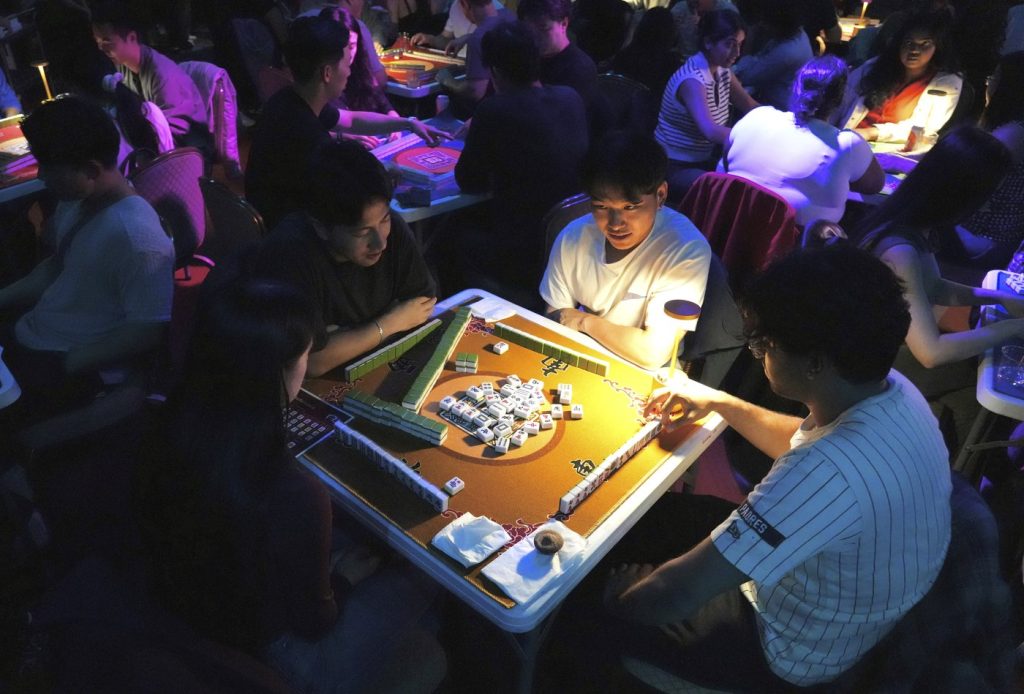In San Francisco, 25-year-old Ryan Lee has sparked a new wave of interest in mahjong, a classic Chinese tile game that originated in 19th century China. After discovering his parents’ sets of the game, Lee began hosting mahjong nights at his apartment two years ago, which led to the formation of the Youth Luck Leisure (YLL) Mahjong Club. The popularity of these gatherings has encouraged Lee to host pop-up mahjong parties in various restaurants, bars, and nightclubs around the city.
These events have attracted a diverse and youthful crowd, with as many as 200 guests participating at each gathering. The atmosphere is lively, featuring live DJs, custom cocktails, and opportunities to socializing. To accommodate novices, instructors are always present to teach the basics of the game. Lee notes that many attendees are intrigued by mahjong despite their unfamiliarity with it, suggesting that there is a cultural component that resonates with participants. He describes this interest as a form of “cultural nostalgia.”
According to data from Eventbrite, a ticketing platform, there was a remarkable 179% increase in mahjong events in the U.S. from 2023 to 2024. The rise in popularity can be attributed to a growing trend among Gen Z who are participating in "grannycore" activities like baking workshops and needlework circles that encourage offline social interaction.
Mahjong is a tactile game, played with tiles featuring different suits, numbers, and Chinese characters. The goal is to create a winning hand composed of four sets of three and a pair, fostering a communal environment among the players. Nicole Wong, a writer and audio producer from Oakland, has noted that the game helps people unplug from their devices and build community. Wong herself learned to play mahjong during family visits to her grandparents in New Zealand in 2009, and she began hosting her own mahjong nights with friends after discovering her parents’ old game sets.
In 2019, Wong initiated The Mahjong Project, which serves as an instructional guide and oral history project influenced by her family’s love for the game. This led her to publish “Mahjong: House Rules from Across the Asian Diaspora,” an illustrated book exploring the history, strategies, traditions, and various playing styles of mahjong. Wong believes that for the Asian American community, there is a renewed interest in reconnecting with heritage and culture, which was less emphasized during her own upbringing.
Since its inception, the YLL Mahjong Club has organized nearly 20 successful events in San Francisco, providing not only an opportunity for people to learn mahjong but also supporting local restaurants, bars, and food vendors involved in the events. Lee's sister has also begun to host similar events in Los Angeles, with future plans to expand the club to other U.S. cities.
The demand for mahjong events is clearly on the rise, as Lee continues to see a growing interest not only in learning the game but also in creating a sense of community. Joyce Yam, the sponsorship manager for YLL Mahjong Club, states that their events often sell out quickly and have long waiting lists. The events welcome participants of all experience levels, with teaching assistants available to guide newcomers through the basics of the game.
Ethan Vuong, a Florida native living in San Francisco, shares his experience of starting to play mahjong with friends a few years ago as a means to connect with his Chinese heritage and meet new people. He regularly participates in events hosted by YLL Mahjong Club and local venues like Baba House, where he volunteers to teach newcomers. Vuong describes mahjong not only as a strategic game but as an expression of one's personality, and he has his sights set on eventually defeating his grandmother in the game.











